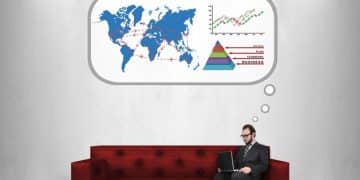US inflation update June: what you need to know

US inflation impacts consumer spending by increasing prices on goods and services, prompting consumers to prioritize essentials, seek discounts, and adjust their budgets while affecting different economic sectors.
US inflation update June sheds light on the evolving economic situation. With prices fluctuating, have you noticed how it impacts your daily life? Let’s delve into the details to understand these changes better.
Overview of current inflation trends
Understanding the current inflation trends is crucial for navigating the economic landscape. As inflation impacts various aspects of our lives, it’s important to break it down into manageable insights.
Inflation Rate Overview
The inflation rate indicates how much prices for goods and services have increased over a specified period. Recent data shows fluctuations that can affect budgeting and spending.
- Consumer Price Index (CPI) changes
- Factors influencing price hikes
- Comparison with previous months
In June, certain sectors experienced notable changes. For instance, the cost of energy and food has been highly volatile, leading to increased concern among consumers. As prices rise, people are reevaluating their spending habits and seeking ways to save.
Key Factors Driving Trends
Several elements contribute to the current inflation trends, including supply chain disruptions and increased demand. These forces combine to result in higher prices across many industries.
- Supply and demand imbalance
- Global economic conditions
- Consumer confidence levels
Understanding these key factors helps provide a clearer picture of how to prepare for continued shifts in the market. As we observe these trends, it becomes essential to stay informed and adapt our financial decisions accordingly.
Key factors driving inflation in June
Several key factors are driving inflation in June, influencing prices and the overall economic climate. Understanding these elements can help consumers and businesses navigate the challenges posed by rising costs.
Supply Chain Issues
One major factor contributing to inflation is ongoing supply chain disruptions. These issues lead to shortages, which push prices higher as demand outstrips supply.
- Delays in shipping and transportation
- Increased freight costs
- Labor shortages in key industries
As companies struggle to maintain inventory, consumers often face limited choices and higher prices. This scenario creates a ripple effect throughout the economy.
Increased Demand
Another critical factor is the surge in consumer demand. As the economy rebounds, people are eager to spend, leading to increased competition for available goods.
- Consumer confidence returning post-pandemic
- Higher disposable income from stimulus measures
- Desire for travel and dining experiences
This heightened demand can further exacerbate inflationary pressures, leading to even higher prices in response to consumer appetite.
Energy Costs
Fluctuations in energy prices also play a significant role in driving inflation. Rising costs for fuel and electricity impact everything from transportation costs to goods pricing.
- Impact of global oil price increases
- Seasonal variations affecting energy demand
- Geopolitical tensions influencing supply
As energy prices creep up, consumers often find their overall expenses increase, prompting adjustments in spending habits.
By understanding these key factors behind the inflationary trends in June, individuals and businesses can make informed decisions while preparing for potential economic shifts.
Impact of inflation on consumer spending

The impact of inflation on consumer spending is significant, affecting how people make purchasing decisions. As prices rise, consumers often feel the strain on their budgets, which can lead to changes in their spending habits.
Changes in Purchasing Behavior
When inflation increases, consumers may start to prioritize essential items over luxury goods. This shift can reflect a need to manage tighter budgets effectively.
- Reduced spending on non-essential items
- Increased focus on value for money
- Preference for store brands over name brands
Consumers are also more likely to seek discounts and compare prices to ensure they get the best deals. These behaviors can change the overall landscape of retail spending.
Effects on Different Income Groups
The effects of inflation are not uniform across all income groups. Lower-income households often feel the pinch more acutely, as they spend a larger share of their income on essentials like food and housing.
- Increased financial stress for low-income families
- Potential decrease in overall savings rates
- Shift towards borrowing or credit usage
In contrast, higher-income groups might not alter their spending habits as drastically. However, they may experience a decrease in discretionary spending as well, which can impact luxury markets.
Long-Term Buying Decisions
Inflation can also lead to changes in long-term buying decisions. For instance, consumers may choose to delay major purchases, like homes or cars, due to uncertainty about future prices.
- Increased interest in financing options
- Heightened awareness of the timing of purchases
- Shift toward used items instead of new
These reactions to inflation highlight the complex ways in which rising prices affect consumer behavior and the economy as a whole. Staying informed about these impacts can help consumers navigate the challenges inflation presents.
How inflation affects different sectors
Understanding how inflation affects different sectors is crucial for grasping its overall impact on the economy. Each sector experiences inflation in unique ways, influencing pricing, consumer behavior, and business strategies.
Consumer Goods and Retail
In the consumer goods and retail sector, inflation often leads to higher prices on everyday items. As manufacturers face increased costs, these expenses are typically passed on to consumers.
- Increased prices on food and household items
- Shift in consumer purchasing towards discount retailers
- More frequent sales and promotions to attract budget-conscious shoppers
This sector may see a rise in demand for store-brand products as consumers seek alternatives to name brands, influenced by rising costs.
Housing Market
Inflation significantly impacts the housing market. As construction costs rise due to inflation, home prices often increase, making it harder for buyers to enter the market.
- Higher mortgage rates affecting purchasing power
- Increased rental prices due to demand
- Greater interest in smaller or more affordable homes
Consequently, prospective homeowners might delay their purchases until they perceive a better economic climate, altering demand dynamics in real estate.
Financial Services
The financial services sector also feels the effects of inflation. Investments and savings strategies might change as consumers seek to preserve their purchasing power.
- Higher interest rates on loans and credit
- Potential shifts towards inflation-protected securities
- Increased demand for financial advice on managing inflation risks
As consumers and businesses reassess their financial situations, banks and financial institutions must adapt to these evolving needs.
Additionally, the impact of inflation varies across sectors, influencing growth, employment, and overall market trends. Awareness of these effects can help stakeholders make informed decisions.
Tips for managing inflation-related challenges
Managing inflation-related challenges requires strategic planning and awareness. Here are some tips to help individuals and families navigate this economic environment effectively.
Budgeting Wisely
Creating a detailed budget is essential in times of rising prices. By tracking spending closely, you can identify areas where cuts can be made.
- Divide expenses into needs and wants
- Monitor monthly spending habits
- Build a buffer for unexpected costs
This approach allows you to prioritize necessary expenses while reducing discretionary spending.
Shopping Smart
Being a savvy shopper can help mitigate the effects of inflation on your wallet. Look for sales, use coupons, and compare prices before making purchases.
- Choose store brands over name brands
- Shop during sales and clearance events
- Consider bulk purchases for non-perishable items
These strategies can lead to significant savings over time.
Investing in Education
Investing in skills and education can be a proactive way to combat inflation. By enhancing your qualifications, you may increase your earning potential and job security.
- Take online courses or workshops
- Network with professionals in your field
- Stay informed about industry trends
In a changing economy, having a diverse skill set can make you more competitive in the job market.
By adopting these tips, you can better manage the financial pressures of inflation. Staying informed and proactive will help you navigate these challenging times.
In conclusion, navigating inflation is a challenge that many face today. By adopting smart budgeting practices, making informed shopping choices, and investing in education, individuals can manage inflation-related pressures more effectively. Staying aware of market trends and adjusting spending habits can help protect your finances. Remember, flexibility and proactive measures are key to thriving in an inflationary environment.
FAQ – Frequently Asked Questions about Inflation and Consumer Spending
What is inflation?
Inflation is the rate at which the general level of prices for goods and services rises, eroding purchasing power.
How does inflation affect my daily expenses?
Inflation increases the cost of living, which can lead to higher prices for food, housing, and everyday items.
What can I do to manage my budget during inflation?
You can manage your budget by tracking your spending, prioritizing essential items, and looking for discounts.
Is it better to invest or save during inflation?
Investing can help protect against inflation, but it is important to assess your risk tolerance and consider inflation-protected securities.





